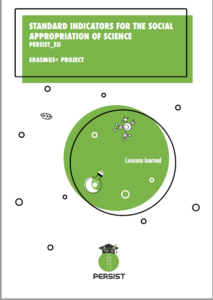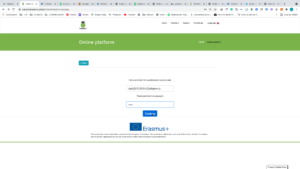The PERSIST_EU Project has presented the book Standard Indicators for Science Social Appropriation in which are compiled the conclusions of the Project. The book also offers a wide guide to take the most of the evaluation platform developed within the Project.
 In addition to this, the ScienceFlows team has made available to interested parties the recording of one of the webinars in which the details of the platform are explained.
In addition to this, the ScienceFlows team has made available to interested parties the recording of one of the webinars in which the details of the platform are explained.
The main goal of the Consortium members is to offer to stakeholders a guide that allows them to use the digital platform and make the most out of it. The platform allows evaluating the changes in perceptions, attitudes, knowledge, and beliefs after taking part in a science activity. This platform is available free and it is specially designed for researchers, secondary teachers, university professors, and science popularisers.
The main objective of the book is to offer interested parties a manual on how to get the most out of the PERSIST digital platform.
Besides the manual about its functioning, the book also includes the results of Virtual Science Camps (VSC) that have allowed the consortium to validate the utility of the platform.VSC have taken place between May and December 2020 and around 500 students have taken part. It also includes some activity proposals to use the application.
Online webinar
Consortium members organised between March and April some webinars in Portugal, Spain, Italy, Slovakia and Germany in order to promote the use of the platform. One of the sessions, organised by ScienceFlows team in coordination with Aula María Zambrano from University of Malaga is available on the YouTube channel of ScienceFlows.
PERSIST_EU Project

The goal of the PERSIST_EU Project, co-funded by the Erasmus+ programme, has been to develop a tool able to assess the change of knowledge, perceptions, attitudes and beliefs after taking part in a science formation activity.
The digital platform makes it possible to evaluate these changes in the four mentioned areas on four scientific topics of certain social relevance: climate change, vaccines, genetically modified organisms and alternative and complementary medicine. Thus, users, after receiving the access code to the platform, answer a short questionnaire prepared by the members of the consortium. Each one of the included questions allows evaluating the perception, belief, attitude and knowledge of the users. At the end of the activity, those same users answer the questions and, in this way, the person who organized the activity can check if there have been any changes. The platform also allows the person organizing the activity to select the sociodemographic questions that they consider most interesting for their activity.
















